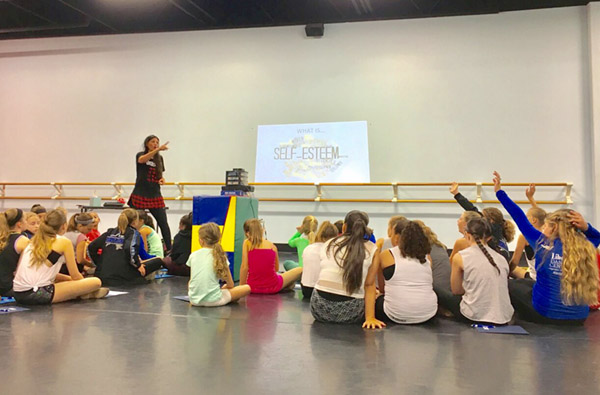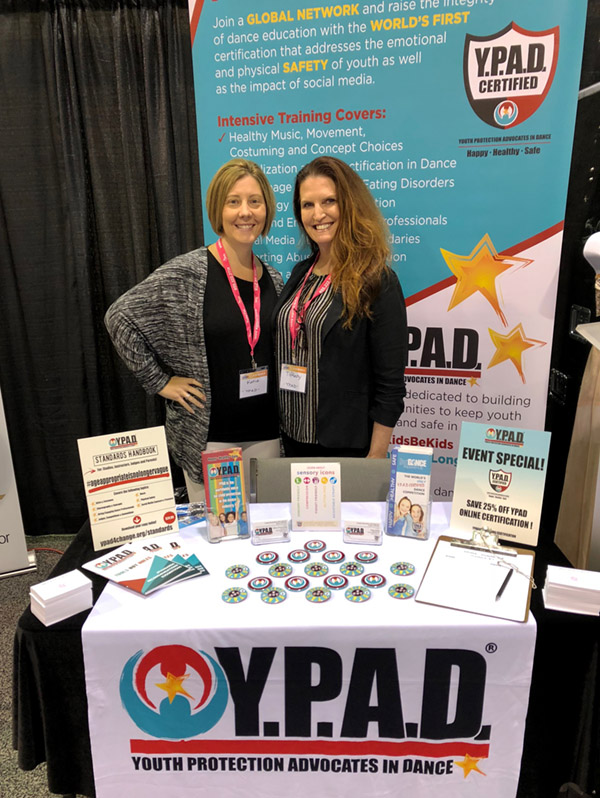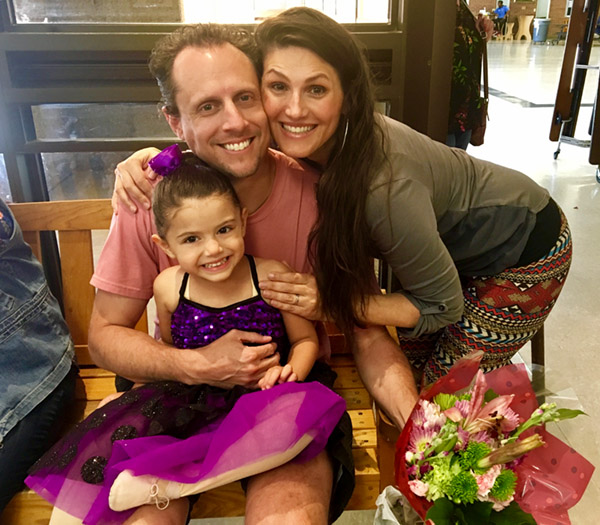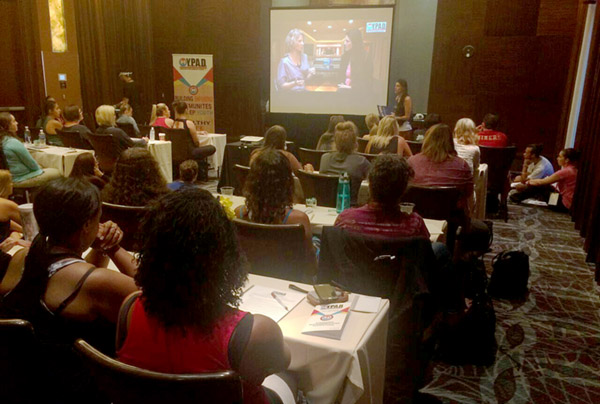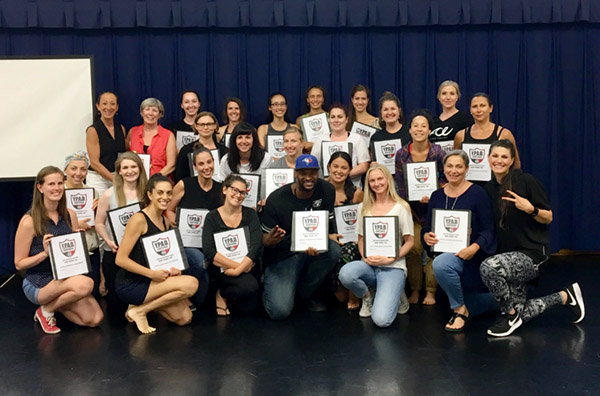Protecting Youth in Dance Through Education
An Interview with Leslie Scott
BY EMMALY WIEDERHOLT
Youth Protection Advocates in Dance (YPAD) is a non-profit dedicated to building empowered dance communities and keeping youth happy, healthy and safe in all dance environments. YPAD’s focus is on providing dance studios, conventions, competitions, instructors, dance professionals, parents, community members and dancers with the support, education, tools and resources they need to make healthy choices in the dance environment and the wider world. Here, founder Leslie Scott shares her own story, how others can get involved, and why YPAD’s mission is more important than ever.
~~
Can you tell me about the history of YPAD and how it got started?
YPAD was an idea in my mind over 10 years ago. I spent almost 20 years in the Hollywood area, and during that time I was on faculty at Edge for 14 years and at Millennium for 12 years. I eventually felt like there was something amiss in terms of a healthy community and holistic wellness. I was witnessing in myself a negative impact on my own physical and emotional health due to body image expectations and comments, a cultural normalization of absent boundaries, sexualization, sexual harassment on jobs, pressures to dance through injury, etc. I knew I was not the only professional dancer experiencing this. It started to become clear to me as I would stay after class speaking with parents that everything we as adults in the professional industry were going through was trickling down to the children who follow us and look to us as role models.
The proposal to use social media as a primary platform to promote dance, coupled with entertainment media, has put youth in the performing arts in the spotlight. Through this, I’ve not only witnessed healthy boundaries for adults being compromised, but also the exploitation and commodification of children. For example, TV programming in dance has increased 500 percent over the past 12 years. Through that increase, we risk commodification and exploitation of those who use their bodies as a tool.
I was on the other side of this issue for a long time. When I moved to LA from Arizona, I was told by superiors and colleagues I would book more jobs and pack my classes if I showed my body more, lost weight, played more sexually explicit music, and created more explicit choreography and concepts. Through self-objectification and self-sexualization, I increased my profile as an in-demand dancer and choreographer, but I lost a healthy mind, body and spirit.
Before moving to LA, my heart was very much in community building and inclusiveness. When I was at Arizona State University, I created the Hip Hop Coalition, which was all about using dance as a vehicle to highlight social justice issues. I allowed this focus to very quickly shift in LA. I altered my choreography, dieted, and dressed more promiscuously. This was the recipe I was told and witnessed worked to “make it” in Hollywood, and it afforded me a great professional career that I now look back on and feel sad I not only allowed others to objectify me, but did so myself. I also never thought about all the children who came every summer from around the world to train at Millennium and Edge.
I was too caught up in my desire for validation to even consider how I was impacting all these kids through my clothing, music and choreography choices, even my behavior online. At first it was YouTube, now it’s Instagram. It was just the beginning of class no longer being for training. The last 15 minutes of class, the best dancers, who maybe didn’t even pay for class, would take footage dancing the choreography to post online to try to go viral and get followers. The students who paid for class basically stand there looking at a show they did not sign up for. As that phenomenon caught on as a recipe for success, at first I didn’t see how demeaning it was to the sacred training environment. Now many of our eyes are open.
In 2011, I had an opportunity to choreograph a Christmas show at an orphanage in Mexico called Casa de la Esperanza. I had never used my talents and love of dance in that capacity, and it profoundly changed my understanding of the healing effects of dance. The children had been traumatized, raped, found in dumpsters, and abandoned on corners. Watching them come to life because I showed up for the opportunity to share expression through dance was more satisfying that any carnival I had choreographed or celebrity I had worked with. Accolades in LA were never satisfying because the next thing I needed to do was book something more impressive.
I had to take a long hard look at myself and how my choices were impacting the children and adolescences I was influencing. I realized that nobody was advocating for children. That’s how the idea of creating YPAD came into place.
When I started to speak out, I was bullied profoundly. I lost many friends and opportunities. It’s important people understand the pushback YPAD has received for bringing up this issue and the power they have to counteract through evidence-based research and strength through numbers. There are powerful entities that are succeeding because it’s lucrative to commodify and sexualize. When you’re using the vulnerable population of children, and parents who may be tempted to live vicariously through their children, it’s even easier for commodification to play out.
How is the organization structured?
It’s been phenomenal to see the volunteer steam behind us. Last year, we had over 4,000 hours of volunteer work done by 18 people. We have grown to 25 advisory panel members. Advocates like Lisa Phelps, Tiffany Prout-Leitao, Joseph Zanovitch, Katie Gatlin, Jill Williams, Jen Ray, Dr. Christina Donaldson, Jennifer Jeter, Vanessa Terrell, Hannah Burkholder, Sammi Rader, Tricia Gomez, Rachel Duggan and so many more have donated countless hours and heart. More Than Just Great Dancing (MTJGT), created by the amazing Misty Lown, became our first visionary sponsor, which paved the way for so much growth. MTJGD and Misty’s Dance Unlimited were first to be YPAD Certified! We have awesome affiliates such as Curtain Call Costumes, who became the first certified costume company and sponsor, guiDANCE Experience (our first certified competition), 360 Dance Festival (our first certified convention), RWID, AcroArts, Acrobatique, NDF, Apolla, Wingman for Dance, Dance Recital Ticketing and more! YPAD’s incredible advisory panel of doctors, therapists and specialists allow us to move this message forward using evidence-based research over opinion.
Things started to take form when I reached out to Dr. Tomi-Ann Roberts, one of the lead researchers on the American Psychological Association’s taskforce on the sexualization of girls. I contacted her and asked if she was aware of the epidemic of sexualization of youth in dance. She quickly came on board and started doing research studies analyzing viral videos. At the time she was the Director of Psychology at Colorado College and has since partnered with YPAD on our social media fast research.
For the past two years, we’ve taken children off social media for three days and done a pre and post survey with them to see if we could, in just three days, shift the participants over into other activities that require self-care, eye contact and relationship. We also ask them to reflect on how social media impacts them as dancers and people. In the subconscious, as you’re scrolling, your self-esteem can be impacted. Because it can be such an unconscious act, we need to slow children down and notice how different posts might lead them to feel envious or over-weight, for example, which can lead to unhealthy behavioral choices.
The research was just published and presented at a conference in England. We found that in just three short days, taking children off social media and having them do journaling and self-reflection increases body positivity, decreases anxiety, and increases mental focus. This was just three days!
On our advisory panel, we also have Dr. Steven Karageanes, our nation’s first orthopedic certified specifically in treating dancers and performing artists, as well as specialists in eating disorders, bullying, conflict management, anxiety, depression and self-harm. Our children in dance experience all these, and dance can often exacerbate it.
YPAD’s incredible advisory panel led to the YPAD Certification, which took two and a half years to develop. Lisa Phelps and Joseph Zanovitch were my partners in creating it along with several advisory panel members. We now have certification available in the US, Canada, Australia, New Zealand and soon more. We believe education can lead to self-regulation. There are two ways to become certified: online or in-person. It’s a 12-hour training over two days at one of our events, or people can do the training online, which takes 6-8 hours and is so simple because it’s self-driven. The certification covers many topics, including social media literacy, body image, bullying, eating disorders, nutrition, sex-abuse and inclusiveness, to name a few. If you’re a studio owner or run a dance-related organization, there are slightly different compliance requirements depending on the entity.
We have an abuse and exploitation module for people to recognize the signs of when a youth has been sexually, emotionally or physically abused. I want to be clear that abuse in all forms is NOT specific to dance. All youth-centered activities run the risk that a perpetrator will infiltrate, but one of the things unique to the dance environment is the fact we have an abundance of passionate teachers who are not generally educated on what to do if they suspect abuse, or even what the red flags are. We educate the signs of grooming, how to take a first disclosure, and how to report, which are incredibly important. As dance teachers, we generally spend more time with these kids than a math teacher, and it is not unusual that they confide sensitive information to us. In those first moments, it’s important not to have a response that could further traumatize the child or teen.
For studios owners and organizations, we have three extra modules; conflict management, hiring tips and branding as a YPAD Certified organization. We really believe that we don’t need to be a watchdog by pointing fingers and “calling out” organizations that are making choices that could harm children. We believe we just need to speak louder about all the great things we’re doing and differentiate ourselves with the YPAD seal.
We launched the certification in 2017, but the first year and a half we only had in-person certifications. Hence, my toddler has been on 103 airplane rides. We call her the YPAD mascot who was born into the job! We’ve travelled all over Canada, the US and Mexico on behalf of YPAD. In the past half year, we launched the online certification. About 800 individuals have become certified to date, as well as about 40 studios and organizations. There are about 34 currently in process. Our goal is to certify 100 organizations by next year.
We also offer an option to audit the certification. Let’s say there’s a dancer who’s not sure they can clean up their social media and stay in compliance with our standards. We believe they can benefit from the overall education. We’re going for progress, not perfection. Education is empowerment, and that creates changes that create shifts. The audit option doesn’t require a background check or CPR card like the full certification.
People like to talk about sexualization, but there are so many other things under the umbrella of inappropriate-ness. What about pushing a child through injury or the worship of hypermobility at the expense of health? We put evidence-based research to the term “appropriate.”
YPAD HAS GENEROUSLY OFFERED STANCE ON DANCE READERS 15% OFF THE CERTIFICATION. ENTER THE DISCOUNT CODE SOD15 TO TAKE ADVANTAGE OF THIS GREAT RESOURCE! GO TO: ypad4change.org/certification TO REGISTER!
What are some ways YPAD is spreading its message?
Our YPAD consultant group works one on one with educators and parents every week to address their specific concerns and needs. We offer seminars for dancer 7-11, 12-18 and for dance parents on a variety of topics related to holistic wellness. We also use our social media presence as well as several partnerships with like-minded organizations who have been awarded the YPAD seal of approval by completing all the certification compliance requirements. One basic thing we all believe in is that no teacher should have access to children without getting a background check. That does not mean we can avert all instances of abuse, but if something happened, the first question would be, “Was a background check done?” This is required of most other teachers, coaches, and volunteers who have access to children. All our affiliates have been background checked. It’s a good business practice that not only protects our kids but also protects us.
From your perspective, has the overall environment for young people in dance been improving over time?
We’ve had a spectrum of wins and heartbreaks. We know people can change. I changed. I know what it’s like to be desensitized when you’re making potentially harmful choices. People thought there was no chance we’d ever have a certified costume company (Curtain Call), competition (guiDANCE) or convention (360 Dance Festival), let alone dozens of certified studios and hundreds of certified educators throughout the US, Canada, Australia and New Zealand. I think it’s important we recognize changing trends, choices and behaviors that are insidious and pervasive in our culture is a marathon, not a sprint. All these wins are truly remarkable and required commitment and unity by many.
It’s also important to recognize these issues are not just happening in dance; it’s happening in the greater culture, which trickles down to dance. We don’t need to get defensive, ashamed or embarrassed that harmful trends are happening in dance. We just need to get educated and start shifting the wind.
Many have seen what has happened in gymnastics. They have a governing body and tremendous oversight but many were complicit in covering up an extensive sex abuse scandal. This is why we just launched Youth Protection Advocates in Gymnastics in April. A governing body is not the answer. Education and advocacy that is led by people of integrity who are not beholden to politics, ego, money or fame and who walk the walk, is.
Our YPAD consultant group is something I’m really proud of, and I don’t use that word lightly. The fact that dance teachers travel with children and spend days with them at events puts us in a privileged position to recognize problems. In the past, as a dance teacher, I have functioned as a nutritionist, a physical therapist, a psychologist and a mediator. I don’t have credentials in those areas. The YPAD consultant group is currently nine doctors, therapists and specialists who specialize in emotional, physical and sexual health. You can visit www.ypad4change.org/consult/ and fill out a privacy agreement to get the bios and credentials of the consultant group, and you can email them confidentially to get consultation on whatever you’re specific issue is, and YPAD pays for it. You will receive a response in 24-48 hours.
This is one reason why we’re hoping people will consider generously giving to our non-profit. Every week, many teachers and parents reach out for consultations. I want the public to know about it so they can utilize it, as well as consider supporting it. Our entire program is funded by people who do the certification or who make donations.
How can people get involved?
People can donate or choose YPAD on Amazon Smile (log on to smile.amazon.com and select Youth Protection Advocates in Dance). It’s such a tiny percentage of your purchase, but it adds up and makes a difference in our ability to provide services and resources when many people do it!
If you hold a credential – maybe you’re a psychologist, nutritionist or physical therapist, or even just great at admin – we need people to volunteer. YPAD is not me; I want people to take responsibility and ownership of this mission. It’s phenomenal we’ve been able to get this far and that is due to all the amazing volunteers, those who have become certified, and donors.
Any other thoughts?
I have witnessed so many ethics exchanged for notoriety and popularity, including my own. That’s become more important than boundaries and education. Many people in dance – and I put myself in this category – have made bad choices because they’re not educated. It’s not because they are bad people. I loved my students when I was making poor choices that impacted them, I just needed more education and healthy mentorship. And it’s not about censorship. If you’re a choreographer who wants to make a piece that could be triggering or harmful to a minor, use adults. Please don’t use children as unknowing vehicles to express your art when it could have a negative impact on them. I believe in freedom of artistic expression, but not at the expense of children’s safety. We can create important art, make a living as a dancer/educator, AND keep youth happy, healthy and safe!
~~
To learn more, visit www.ypad4change.org.
AGAIN, YPAD HAS GENEROUSLY OFFERED STANCE ON DANCE READERS 15% OFF THE CERTIFICATION. ENTER THE DISCOUNT CODE SOD15 TO TAKE ADVANTAGE OF THIS GREAT RESOURCE! GO TO: ypad4change.org/certification TO REGISTER!

